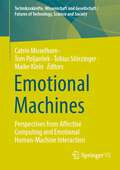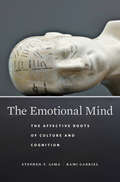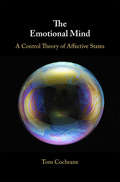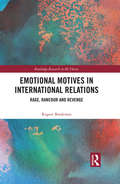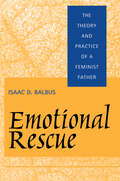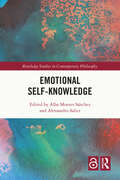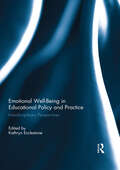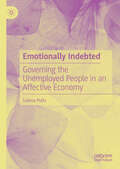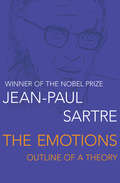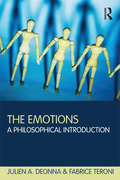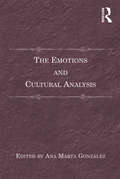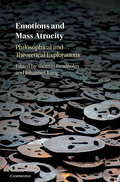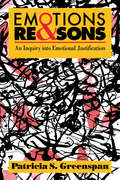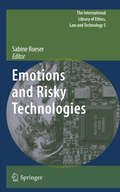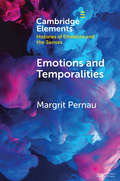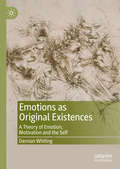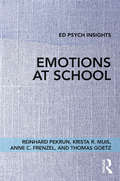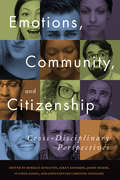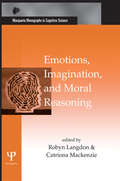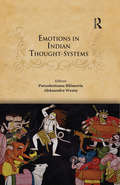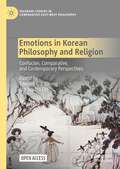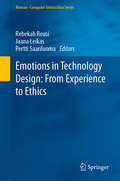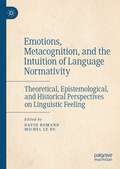- Table View
- List View
Emotional Machines: Perspectives from Affective Computing and Emotional Human-Machine Interaction (Technikzukünfte, Wissenschaft und Gesellschaft / Futures of Technology, Science and Society)
by Catrin Misselhorn Tom Poljanšek Tobias Störzinger Maike KleinCan machines simulate, express or even have emotions? Is it a good to build such machines? How do humans react emotionally to them and how should such devices be treated from a moral point of view? This volume addresses these and related questions by bringing together perspectives from affective computing and emotional human-machine interaction, combining technological approaches with those from the humanities and social sciences. It thus relates disciplines such as philosophy, computer science, technology, psychology, sociology, design, and art. The volume offers readers interested in the phenomenon of emotional machines new perspectives from a variety of disciplines and addresses fundamental questions that will become pressing in the foreseeable future as emotional machines increasingly populate our everyday lives.
The Emotional Mind: The Affective Roots of Culture and Cognition
by Stephen T. AsmaFor 200 million years before humans developed a capacity to reason, the emotional centers of the brain were hard at work. Stephen Asma and Rami Gabriel help us understand the evolution of the mind by exploring this more primal capability that we share with other animals: the power to feel, which is the root of so much that makes us uniquely human.
The Emotional Mind: A Control Theory of Affective States
by Tom CochraneIn this book, Tom Cochrane develops a new control theory of the emotions and related affective states. Grounded in the basic principle of negative feedback control, his original account outlines a new fundamental kind of mental content called 'valent representation'. Upon this foundation, Cochrane constructs new models for emotions, pains and pleasures, moods, expressive behaviours, evaluative reasoning, personality traits and long-term character commitments. These various states are presented as increasingly sophisticated layers of regulative control, which together underpin the architecture of the mind as a whole. Clearly structured and containing numerous diagrams and examples to illustrate the discussion, this study draws on the latest research from fields including philosophy, psychology and neuroscience, and will appeal to readers interested in the philosophy and cognitive science of emotion.
Emotional Motives in International Relations: Rage, Rancour and Revenge (Routledge Research in International Relations Theory)
by Rupert BrodersenThe study of emotions in International Relations is gaining wide-spread attention. Within the "emotional turn" in IR the emotion of rage however has not been given sufficient attention, instead being used as short-hand for irrationality and excess. Rage is arguably one of the oldest and most destructive emotions in human affairs. This book offers an innovative approach that seeks to split rage into its traditional manifestation of aggression and violence, and into a less visible, passive manifestation of Nietzschean Ressentiment. This model facilitates a comprehensive understanding of revisionist motivation, from the violence of ISIS to the oppositionism of Putin’s Russia. The aim is to illustrate how a lack of violence can belie vengeful impulses and a silent rage, and how acts of violence, regardless of brutality, are often framed as a type of justice and "moral imperative" in the mind of the aggressor. This book raises serious questions and concerns about legitimacy and order in global affairs, and offers a firm theoretical basis for the exploration of present day conflicts.
Emotional Rescue: The Theory and Practice of a Feminist Father (Thinking Gender Ser.)
by Isaac D. BalbusWeaving personal narrative with a synthesis of feminist mothering theory and psychoanalytic theories of narcissism, Isaac D. Balbus describes his effort to share in the care of his daughter during her first four years.
Emotional Self-Knowledge (Routledge Studies in Contemporary Philosophy)
by Alba Montes Sánchez Alessandro SaliceThis volume sheds light on the affective dimensions of self-knowledge and the roles that emotions and other affective states play in promoting or obstructing our knowledge of ourselves. It is the first book specifically devoted to the issue of affective self-knowledge. The relation between self-knowledge and human emotions is an often emphasized, but poorly articulated one. While philosophers of emotion tend to give affectivity a central role in making us who we are, the philosophical literature on self-knowledge focuses overwhelmingly on cognitive states and does not give a special place to the emotions. Currently there is little dialogue between both fields or with other philosophical traditions that have important contributions to make to this topic, such as phenomenology and Asian philosophy. This volume brings together philosophers from the relevant fields to explore two related sets of questions: First, do philosophers of emotion exaggerate the importance of our affective lives in making us who we are? Or is it philosophers of self-knowledge who misunderstand emotions? Second, what is the role of emotions in self-knowledge? What sort of self-knowledge can be secured by paying attention to our emotions? Emotional Self-Knowledge is an essential resource for researchers and advanced students working on philosophy of emotion, philosophy of mind, epistemology, philosophical psychology, and phenomenology.
Emotional Well-Being in Educational Policy and Practice: Interdisciplinary Perspectives
by Kathryn EcclestoneSchools in numerous countries around the world have become key sites for interventions designed to enhance the emotional well-being of children and young people, offering new forms of pedagogy and curriculum knowledge informed in ad hoc and eclectic ways by various strands of psychology, counselling and therapy.Responding to C. Wright Mills famous injunction for a ‘sociological imagination this unique inter-disciplinary collection of papers explores ideologies and imperatives that frame contemporary education policy and practice around emotional well-being, ideas and assumptions about the state of childhood today, and the changing nature of the curriculum subject and associated forms of knowledge. In bringing together British and American advocates of behavioural interventions in social and emotional learning alongside critics who draw on historical, philosophical and sociological perspectives, it highlights new and important debates for policy makers, the designers, implementers and evaluators of interventions and those who participate in them.This book was originally published as a special issue of Research Papers in Education.
Emotionally Indebted: Governing the Unemployed People in an Affective Economy
by Sabina PultzThis book explores the lived experience of unemployment from a critical social psychological perspective. It connects the condition of unemployment to governance structures and wider societal issues, such as the labor market tendencies of precarity and enterprise culture. Based on qualitative data collected in Denmark and America, the book gives voice to unemployed people to critically discuss both the intended and unintended consequences of active labor market measures, as well as the frequent moral evaluations that surround unemployment. The author explores how unemployed people make sense of and deal with the demands and activities required by activation policies or ALMPs, which tend to make the job seekers responsible for finding a solution to their condition. Building from the subjective experience of unemployment, it maps the complex emotional demands on jobseekers who should feel shame and self-blame but also display motivation and passion on the labor market. Presenting emotions and feelings as pivotal instruments of the governmentality of worklessness, this book addresses the lack of critical discussion and research into the unemployment experience and offers a useful, provocative perspective for students, scholars, and practitioners alike in social psychology, social policy, economic policy, and related disciplines.
The Emotions: Outline of a Theory
by Jean-Paul SartreOne of the leading twentieth-century French existentialist philosophers examines how human emotions shape our existence. In The Emotions: Outline of a Theory, French philosopher Jean-Paul Sartre attempts to understand the role emotions play in the human psyche. Sartre analyzes fear, lust, anguish, and melancholy while asserting that human beings begin to develop emotional capabilities from a very early age, which helps them identify and understand the emotions&’ names and qualities later in life. Helping to complete the circle of Sartre&’s many theories on existentialism, this vital piece of literature is a must-have for the philosopher-in-training&’s collection.
The Emotions: Outline of a Theory
by Jean-Paul SartreOne of the leading twentieth-century French existentialist philosophers examines how human emotions shape our existence. In The Emotions: Outline of a Theory, French philosopher Jean-Paul Sartre attempts to understand the role emotions play in the human psyche. Sartre analyzes fear, lust, anguish, and melancholy while asserting that human beings begin to develop emotional capabilities from a very early age, which helps them identify and understand the emotions&’ names and qualities later in life. Helping to complete the circle of Sartre&’s many theories on existentialism, this vital piece of literature is a must-have for the philosopher-in-training&’s collection.
The Emotions: A Philosophical Introduction
by Fabrice Teroni Julien DeonnaThe emotions are at the centre of our lives and, for better or worse, imbue them with much of their significance. The philosophical problems stirred up by the existence of the emotions, over which many great philosophers of the past have laboured, revolve around attempts to understand what this significance amounts to. Are emotions feelings, thoughts, or experiences? If they are experiences, what are they experiences of? Are emotions rational? In what sense do emotions give meaning to what surrounds us? The Emotions: A Philosophical Introduction introduces and explores these questions in a clear and accessible way. The authors discuss the following key topics: the diversity and unity of the emotions the relations between emotion, belief and desire the nature of values the relations between emotions and perceptions emotions viewed as evaluative attitudes the link between emotions and evaluative knowledge the nature of moods, sentiments, and character traits. Including chapter summaries and guides to further reading, The Emotions: A Philosophical Introduction is an ideal starting point for any philosopher or student studying the emotions. It will also be of interest to those in related disciplines such as psychology and the social sciences.
The Emotions and Cultural Analysis
by Ana Marta GonzálezAmidst prevailing debates that construe rationality and emotionality as polar opposites, this book explores the manner in which emotions shape not only prevailing conceptions of rationality, but also culture in general terms, making room for us to speak of an 'emotional culture' specific to late-modern societies. Presenting case studies involving cultural artefacts, narratives found in fictional and non-fictional literature and television programs, speech patterns and self-talk, fashion, and social networking practices, The Emotions and Cultural Analysis sheds light on the relationship between emotion and culture and the ways in which emotion can be harnessed for the purposes of cultural analysis. An interdisciplinary volume containing the latest research from sociology, philosophy, literary studies, linguistics, and communication, this book will be of interest to those working on the sociology and philosophy of emotion, cultural studies, and cultural theory.
Emotions and Mass Atrocity: Philosophical and Theoretical Explorations
by Thomas Brudholm Johannes LangThe study of genocide and mass atrocity abounds with references to emotions: fear, anger, horror, shame and hatred. Yet we don't understand enough about how 'ordinary' emotions behave in such extreme contexts. Emotions are not merely subjective and interpersonal phenomena; they are also powerful social and political forces, deeply involved in the history of mass violence. Drawing on recent insights from philosophy, psychology, history, and the social sciences, this volume examines the emotions of perpetrators, victims, and bystanders. Editors Thomas Brudholm and Johannes Lang have brought together an interdisciplinary group of prominent scholars to provide an in-depth analysis of the nature, value, and role of emotions as they relate to the causes and dynamics of mass atrocities. The result is a new perspective on the social, political, and moral dimensions of emotions in the history of collective violence and its aftermath.
Emotions and Reasons: An Inquiry into Emotional Justification
by Patricia S. GreenspanIn Emotions and Reasons, Patricia Greenspan offers an evaluative theory of emotion that assigns emotion a role of its own in the justification of action. She analyzes emotions as states of object-directed affect with evaluative propositional content possibly falling short of belief and held in mind by generalized comfort or discomfort.
Emotions and Risky Technologies
by Sabine RoeserBy offering an original and challenging approach to the topic of risk and emotion, this book covers new territory. It focuses on risk and emotion from the perspective of moral philosophy and emphasizes that emotions are an important source of moral knowledge.
Emotions and Temporalities (Elements in Histories of Emotions and the Senses)
by Margrit PernauThis Element brings together the history of emotions and temporalities, offering a new perspective on both. Time was often imagined as a movement from the past to the future: the past is gone and the future not yet here. Only present-day subjects could establish relations to other times, recovering history as well as imagining and anticipating the future. In a movement paralleling the emphasis on the porous self, constituted by emotions situated not inside but between subjects, this Element argues for a porous present, which is open to the intervention of ghosts coming from the past and from the future. What needs investigating is the flow between times as much as the creation of boundaries between them, which first banishes the ghosts and then denies their existence. Emotions are the most important way through which subjects situate and understand themselves in time.
Emotions as Original Existences: A Theory of Emotion, Motivation and the Self
by Demian WhitingThis book defends the much-disputed view that emotions are what Hume referred to as ‘original existences’: feeling states that have no intentional or representational properties of their own. In doing so, the book serves as a valuable counterbalance to the now mainstream view that emotions are representational mental states. Beginning with a defence of a feeling theory of emotion, Whiting opens up a whole new way of thinking about the role and centrality of emotion in our lives, showing how emotion is key to a proper understanding of human motivation and the self. Whiting establishes that emotions as types of bodily feelings serve as the categorical bases for our behavioural dispositions, including those associated with moral thought, virtue, and vice.The book concludes by advancing the idea that emotions make up our intrinsic nature - the characterisation of what we are like in and of ourselves, when considered apart from how we are disposed to behave. The conclusion additionally draws out the implications of the claims made throughout the book in relation to our understanding of mental illness and the treatment of emotional disorders.
Emotions at School (Ed Psych Insights)
by Reinhard Pekrun Krista R. Muis Anne C. Frenzel Thomas GoetzFor more than a decade, there has been growing interest in the role of emotions in academic settings. Written by leading experts on learning and instruction, Emotions at School focuses on the connections between educational research and emotion science, bringing the subject to a wider audience. With chapters on how emotions develop and work, evidence-based recommendations about how to foster adaptive emotions, and clear explanations of key concepts and ideas, this concise volume is designed for any education course that includes emotions in the curriculum. It will be indispensable for student researchers and both pre- and in-service teachers alike.
Emotions, Community, and Citizenship: Cross-Disciplinary Perspectives
by Constantine Vassiliou James Mckee Kiran Banerjee Rebecca Kingston Yi-Chun ChienEmotions are at the very heart of individual and communal actions. They influence our social and interpersonal behaviour and affect our perspectives on culture, history, politics, and morality. Emotions, Community, and Citizenship is a pioneering work that brings together scholars from an array of disciplines in order to challenge and unite the disciplinary divides in the study of emotions. These carefully selected studies highlight how emotions are studied within various disciplines with particular attention to the divide between naturalistic and interpretive approaches. The editors of this volume have provided a nuanced and insightful introduction and conclusion which provide not only an overarching commentary but a framework for the interdisciplinary approach to emotion studies.
Emotions, Imagination, and Moral Reasoning (Macquarie Monographs in Cognitive Science)
by Robyn Langdon Catriona MackenzieThis volume brings together philosophical perspectives on emotions, imagination and moral reasoning with contributions from neuroscience, cognitive science, social psychology, personality theory, developmental psychology, and abnormal psychology. The book explores what we can learn about the role of emotions and imagination in moral reasoning from psychopathic adults in the general community, from young children, and adolescents with callous unemotional traits, and from normal child development. It discusses the implications for philosophical moral psychology of recent experimental work on moral reasoning in the cognitive sciences and neurosciences. Conversely, it shows what cognitive scientists and neuroscientists have still to learn from philosophical perspectives on moral reasoning, moral reflection, and moral responsibility. Finally, it looks at whether experimental methods used for researching moral reasoning are consistent with the work in social psychology and with philosophical thought on adult moral reasoning in everyday life. The volume's wide-ranging perspectives reflect the varied audiences for the volume, from students of philosophy to psychologists working in cognition, social and personality psychology, developmental psychology, abnormal psychology, and cognitive neuroscience.
Emotions in Indian Thought-Systems
by Purushottama Bilimoria; Aleksandra WentaA stimulating account of the wide range of approaches towards conceptualising emotions in classical Indian philosophical–religious traditions, such as those of the Upanishads, Vaishnava Tantrism, Bhakti movement, Jainism, Buddhism, Yoga, Shaivism, and aesthetics, this volume analyses the definition and validity of emotions in the construction of
Emotions in Korean Philosophy and Religion: Confucian, Comparative, and Contemporary Perspectives (Palgrave Studies in Comparative East-West Philosophy)
by Edward Y. J. Chung Jea Sophia OhThis pioneering book presents thirteen articles on the fascinating topic of emotions (jeong 情) in Korean philosophy and religion. Its introductory chapter comprehensively provides a textual, philosophical, ethical, and religious background on this topic in terms of emotions West and East, emotions in the Chinese and Buddhist traditions, and Korean perspectives. Chapters 2 to 5 of part I discuss key Korean Confucian thinkers, debates, and ideas. Chapters 6 to 8 of part II offer comparative thoughts from Confucian moral, political, and social angles. Chapters 9 to 12 of part III deal with contemporary Buddhist and eco-feminist perspectives. The concluding chapter discusses ground-breaking insights into the diversity, dynamics, and distinctiveness of Korean emotions.This is an open access book.
Emotions in Technology Design: From Experience to Ethics (Human–Computer Interaction Series)
by Rebekah Rousi Jaana Leikas Pertti SaariluomaUnderstanding emotions is becoming ever more valuable in design, both in terms of what people prefer as well as in relation to how they behave in relation to it. Approaches to conceptualising emotions in technology design, how emotions can be operationalised and how they can be measured are paramount to ascertaining the core principles of design. Emotions in Technology Design: From Experience to Ethics provides a multi-dimensional approach to studying, designing and comprehending emotions in design. It presents emotions as understood through basic human-technology research, applied design practice, culture and aesthetics, ethical approaches to emotional design, and ethics as a cultural framework for emotions in design experience. Core elements running through the book are: cognitive science – cognitive-affective theories of emotions (i.e., Appraisal); culture – the ways in which our minds are trained to recognise, respond to and influence design; and ethics – a deep cultural framework of interpretations of good versus evil. This ethical understanding brings culture and cognition together to form genuine emotional experience. This book is essential reading for designers, technology developers, HCI and cognitive science scholars, educators and students (at both undergraduate and graduate levels) in terms of emotional design methods and tools, systematic measurement of emotion in design experience, cultural theory underpinning how emotions operate in the production and interaction of design, and how ethics influence basic (primal) and higher level emotional reactions. The broader scope equips design practitioners, developers and scholars with that ‘something more’ in terms of understanding how emotional experience of technology can be positioned in relation to cultural discourse and ethics.
Emotions in the Moral Life
by Robert C. RobertsRobert C. Roberts extends to the moral life the account of emotions presented in his Emotions: An Essay in Aid of Moral Psychology (2003), that they are "concern-based construals." In this book the author explains how emotions can be a basis for moral judgments, how they account for the deeper moral identity of actions we perform, how they are constitutive of morally valenced personal relationships like friendship, enmity, collegiality and parenthood, and how both pleasant and unpleasant emotions interact with our personal wellbeing (eudaimonia). He argues that none of these dimensions of emotions' values is reducible to any of the others. He continues by sketching how all of these moral dimensions contribute to emotions' participation, in diverse ways, in our virtues and vices.
Emotions, Metacognition, and the Intuition of Language Normativity: Theoretical, Epistemological, and Historical Perspectives on Linguistic Feeling
by David Romand Michel Le DuThis book proposes a comprehensive discussion of the issue of linguistic feeling, the subject’s metalinguistic capacity to intuitively apprehend the normative – lexical, syntactic, morphological, phonological… – dimensions of a definite language he or she is acquainted with. The volume’s twelve contributions aim to revisit a concept that, through a fluctuating terminology (“Sprachgefühl,” “sentiment de la langue,” “linguistic intuitions,” etc.), had developed, since the late 18th century, within a variety of cultural contexts and research traditions, and whose theoretical, epistemological, and historical ins and outs had not been systematically explored so far. Beginning with a long opening chapter, the book consists of two parts, one tracing the multifaceted approaches to linguistic feeling from Herder to Wittgenstein, and one offering a representative overview of the debates about the issue at stake in current linguistics and philosophy, while addressing the question of the place of metacognition, normativity, and affectivity in language processes.
